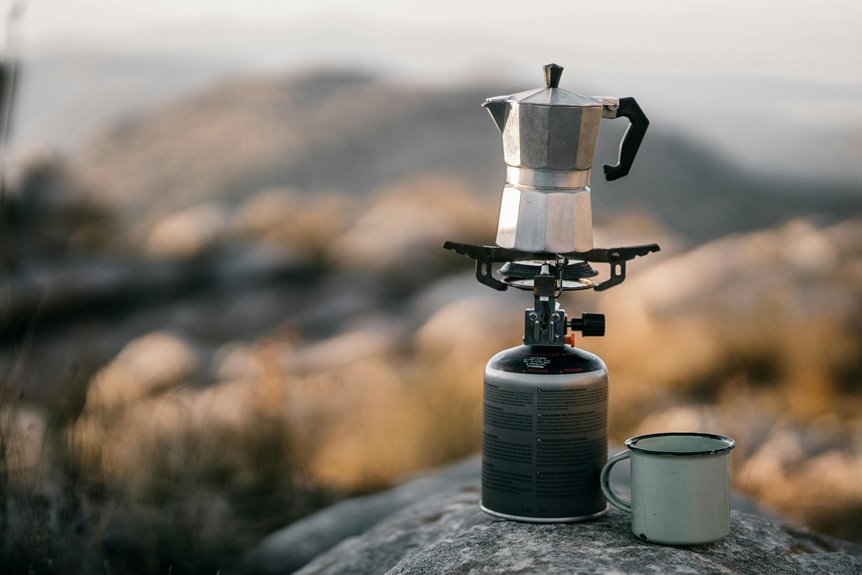The Best Coffee Gear for Beginners: What You Really Need

When you’re starting your coffee journey, having the right gear can make all the difference. A reliable drip coffee maker or a French press can set the stage for brewing success, while a good burr grinder guarantees your beans are ground to perfection. You’ll also need quality storage and precise measuring tools to maintain consistency. Understanding these essentials is just the beginning; there’s more to explore when it comes to elevating your coffee experience.
Understanding Different Brewing Methods
When you plunge into the world of coffee, understanding different brewing methods is essential for revealing the full potential of your beans.
Each brewing technique, whether it’s pour-over, French press, or espresso, affects flavor extraction markedly.
Mastering these methods allows you to control variables like water temperature and grind size, enhancing the complexity and richness of your coffee experience.
Essential Coffee Makers for Beginners
While exploring the essentials of brewing coffee, choosing the right coffee maker can greatly elevate your experience.
For beginners, drip machines offer convenience and consistency, allowing you to brew multiple cups effortlessly.
Alternatively, a French press provides a rich, full-bodied flavor by steeping coffee grounds directly, giving you more control over the brewing process.
Both options cater to different tastes and preferences, enhancing your coffee journey.
Must-Have Coffee Accessories
To truly enhance your coffee brewing experience, investing in a few must-have accessories can make all the difference.
Quality coffee storage containers prevent oxidation, keeping your beans fresh longer. Additionally, a reliable scale guarantees precise measurements, enhancing your brewing consistency.
Don’t overlook a good grinder; it releases the full flavor potential. These brewing accessories are vital for elevating your coffee game.
Choosing the Right Coffee Beans
How do you choose the right coffee beans when faced with so many options?
Start by exploring single origin beans, which offer unique flavor profiles tied to their geographical source.
Pay attention to flavor notes like chocolate, fruit, or nutty undertones, as these will guide your preferences.
Experimenting with different beans will help you discover what you truly enjoy in your cup.
The Importance of Grinding Coffee
Grinding coffee is vital for maximizing flavor extraction, as the process greatly influences the quality of your brew.
The grind size determines how quickly water extracts flavors during brewing. Using burr grinders guarantees a consistent grind, which is essential for achieving balanced results.
Inconsistent grind sizes can lead to over-extraction or under-extraction, compromising the taste.
Invest in a good burr grinder for the best brewing.
Water Quality and Temperature
When brewing coffee, the quality of your water plays a vital role in extracting the flavors you desire.
Ideally, you should aim for water that’s clean, filtered, and free from impurities, as these can alter the taste.
Additionally, maintaining the right brewing temperature—between 195°F and 205°F—ensures ideal extraction, enhancing your overall coffee experience.
Importance of Water Quality
Water quality plays an essential role in brewing the perfect cup of coffee, and it’s often an overlooked aspect for beginners.
Proper water filtration guarantees impurities don’t alter flavor, while maintaining a good mineral balance enhances extraction.
- Use filtered water to reduce contaminants.
- Aim for a balanced mineral content.
- Test your water’s pH for ideal brewing.
Ideal Brewing Temperatures
Achieving the perfect brew hinges not only on water quality but also on the ideal brewing temperature. Maintaining specific ideal temperature ranges guarantees brewing consistency, impacting flavor extraction. Here’s a quick reference table for best temperatures across different brewing methods:
| Brewing Method | Ideal Temperature Range | Brewing Time |
|---|---|---|
| French Press | 195°F – 205°F | 4 minutes |
| Drip Coffee | 195°F – 205°F | 5 minutes |
| Espresso | 190°F – 200°F | 25-30 seconds |
| Pour Over | 195°F – 205°F | 3-4 minutes |
| Cold Brew | 60°F – 70°F | 12-24 hours |
Measuring Coffee and Water Ratios
Getting the coffee and water ratio right is essential for achieving the perfect brew, as even minor adjustments can greatly impact flavor extraction.
Common ratios like 1:15 or 1:17 provide a solid foundation, but experimenting within those ranges can lead to your ideal cup.
To guarantee precision, invest in a scale and a reliable measuring tool, as consistency is key to mastering your brewing technique.
Importance of Accurate Measurement
To brew a consistently great cup of coffee, precise measurement of coffee and water ratios is essential.
Utilizing effective measurement techniques, like weighing scales, guarantees you achieve the perfect balance:
- Enhances flavor extraction
- Reduces variability in each brew
- Provides a foundation for experimentation
Investing in accurate tools not only elevates your coffee experience but also cultivates your brewing skills over time.
Common Ratios Explained
Understanding the right coffee-to-water ratio can greatly impact the taste and quality of your brew.
Common brewing ratios range from 1:15 to 1:18, depending on your desired flavor balance. A 1:15 ratio yields a stronger coffee, while 1:18 produces a milder cup.
Experimenting with these ratios helps you fine-tune your brew, ensuring you achieve the perfect flavor profile every time.
Tools for Precision Brewing
Accurate measurement is essential for achieving the perfect coffee-to-water ratio, and having the right tools can make all the difference in your brewing process.
Investing in these items guarantees consistency and enhances flavor:
- Coffee scales: For precise measurements of coffee grounds and water.
- Brewing thermometers: To monitor water temperature for best extraction.
- Graduated cylinders: For accurate water volume measurement.
With these tools, you’re set for success!
Cleaning and Maintaining Your Equipment
While it might seem tedious, regularly cleaning and maintaining your coffee equipment is essential for achieving the best flavor and longevity from your gear. Use effective cleaning techniques like descaling and deep cleaning, along with these maintenance tips:
| Equipment | Cleaning Techniques | Maintenance Tips |
|---|---|---|
| Grinder | Brush and wipe | Calibrate regularly |
| Brewer | Run vinegar solution | Replace filters often |
| Kettle | Wipe with damp cloth | Check for scale buildup |
| French Press | Disassemble and wash | Inspect seals regularly |
| Scale | Clean with citric acid | Store in dry place |
Exploring Flavor Profiles and Tasting Techniques
Have you ever wondered how the subtle nuances in coffee can transform your daily brew into an extraordinary experience?
By exploring flavor profiles and using tasting techniques, you can enhance your appreciation. Utilize the flavor wheel to identify:
- Fruity notes
- Earthy undertones
- Sweetness levels
These elements guide your tasting journey, revealing the complexity and richness in each cup you savor.
Final Thoughts
With the right gear, you can elevate your coffee experience from ordinary to extraordinary. Start with a dependable drip coffee maker and a French press to explore different flavors. Invest in a quality burr grinder for ideal grind size and guarantee you’ve got proper storage for your beans. Don’t forget a precise scale for accurate measurements. By mastering these elements, you’ll access the full potential of each cup and truly appreciate the art of coffee brewing.






